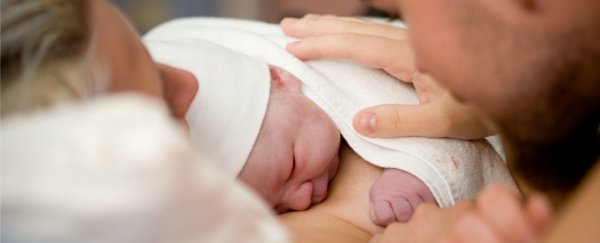Obstetricians in the UK are meeting this month to discuss whether they should be formally offering women advice on the risks of vaginal births - just like they do with caesarian sections.
Right now, women legally need to be warned about the risks associated with C-sections - such as the increased healing time - but not vaginal births, despite the fact that they come with their own unique complications.
In other words, while many obstetricians present their patients with the facts about both options, they're not formally required to do so in the UK - that's a similar situation to countries such as the US and Australia.
The meeting comes after the UK Supreme Court last year awarded almost $9 million in damages to a woman whose baby had sustained brain damage during vaginal birth - a result of the baby being starved of oxygen for too long.
In this case, her doctor knew she was more likely to have complications due to having a small pelvis and diabetes, but never told her about any of these increased risks.
Now the Royal College of Obstetricians and Gynaecologists will discuss whether they should change their procedure and guidelines in order to be more open about the risks of a natural birth.
Right now in the US, UK, and Australia, women technically can request a planned C-section without a medical reason, but they have to sign a waiver saying they've been warned about the dangers first, and the final decision is heavily influenced by their doctors' advice.
That means that many women are recommended to have a natural birth because, for now at least, the standard policy is to give it a try unless there's a good reason not to.
But the evidence is mounting that, as first-time mothers get older, having a pre-planned, elective caesarian might in fact be the safest option.
At any age, vaginal births come with a risk of the woman's pelvic floor muscles tearing, as well as complications causing the baby to go into trauma, or forcing the mother to undergo an emergency C-section.
But with the average age of first-time mothers now hovering around 30 in many developed nations, those risks get even higher.
A 2014 study led by Hans Peter Dietz from the Sydney Medical School in Australia showed that, for every year later a woman has her first child, her risk of the pelvic floor muscles tearing increases by 6 percent.
And the chance of the muscles detaching from the pubic bone altogether - something that greatly raises the risk of prolapse later in life - increases from 10 percent at the age of 20, to 20 percent by the age of 40. "They have the right to know that," Dietz told New Scientist.
"Age is a factor because our muscles and ligaments get less stretchy as we grow older," Wilson reports. "This makes them more likely to tear during childbirth, and increases the likelihood of needing an emergency C-section, which carries a higher risk of infection, haemorrhage, and blood clots than planned C-sections."
That's not to say planned C-sections are risk free - the surgery carries the danger of infection, blood loss, and can lead to complications with future pregnancies.
But those risks should officially need to be presented alongside the rest of the facts, says Bryan Beattie, an obstetrician with the UK's National Health Service.
"They have got leaflets about C-sections, yet most people opt for a vaginal birth and there are no risk leaflets for them," he told New Scientist.
Not everyone agrees, though, with many worried that more women will choose to have caesarians unnecessarily if the risks of natural birth are emphasised to strongly.
"A vaginal birth is not a treatment, it's a natural consequence of being pregnant," said Deborah Chippington Derrick of the Association for Improvements in the Maternity Services.
"We need a healthy debate on what the emphasis should be," added Louise Silverton of the Royal College of Midwives.
But according to Beattie, the choice should come down to the women.
"You might say to me: 'I could cope with a wound infection if I had a C-section but I could not cope with faecal incontinence from a bad vaginal delivery'," he told New Scientist. "You should be allowed to make that choice but you can't if you don't have the information."
We'll be following the decision made by obstetricians in the UK this month closely, and, hopefully, so will the rest of the world.
